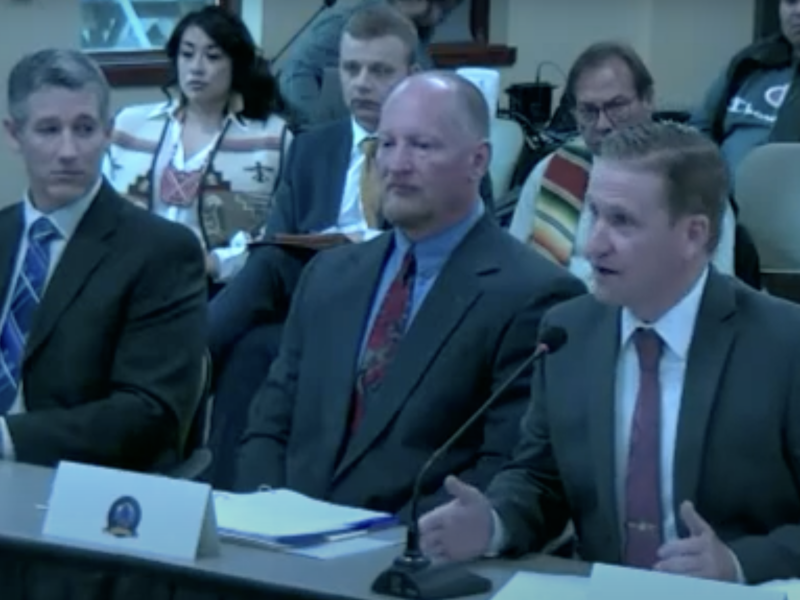Legislative Committee Advances DNA Program
Proposed bill allocates $150,000 to fund five-year pilot program with DCI
- Published In: Politics
- Last Updated: Nov 24, 2023

Wyoming Division of Criminal Investigation Director Ronnie Jones (right to left), Commander Ryan Cox and Scott McWilliams, Deputy Director of State Crime Lab, explain to the Select Committee on Tribal Relations how the forensic genetic genealogy pilot program would benefit the agency. (Screenshot from YouTube of Wyoming Legislature Tribal Select Committee on Nov. 16.)
By Jennifer Kocher
Special to the Wyoming Truth
A draft bill that would create a forensic genetic genealogy (FGG) pilot program for state law enforcement took another step forward following a unanimous vote from the Select Committee on Tribal Relations on Nov. 16.
The bill would appropriate $150,000 to the Wyoming Division of Criminal Investigation (DCI) to develop a five-year program starting in 2024. DCI would be able to deploy the funds to use forensic genetic genealogy to assist in generating leads or identifying human remains. A secondary role would allow the agency to facilitate forensic genetic genealogy grants for law enforcement agencies throughout the state. If enacted, the program would begin July 2024.
Forensic genetic genealogy has rapidly become a game changer in helping solve cold cases, according to Joan Hanlon, an investigative genetic genealogist with United Data Connect who presented to the committee in July.
The technology uses a person’s DNA to create a forensic profile in cases where a suspect or unidentified human remains are unknown and have not been entered into the Combined DNA Index System (CODIS). Forensic genealogists use DNA markers to identify potential relatives to help make an identification.
Law enforcement agencies are permitted to use forensic genetic genealogy for unsolved violent crimes or when a case involves unidentified remains of a suspected homicide victim where there’s no match in CODIS, according to the U.S. Department of Justice.
In many cases, forensic genealogists use sites like GED Match, where individuals have voluntarily submitted their DNA profiles derived from testing companies such as Ancestry and 23andMe, among others.
Committee chairwoman Rep. Ember Oakley (R-Riverton) said the program, which models those in other states, would keep Wyoming in the forefront of developing technologies.
“I think as far as criminal justice, it’s an exciting direction,” Oakley said. “There have been some interesting, very long-term cases that have been solved using this technology.”
DCI Director Ronnie Jones called it a “step in the right direction” in helping to clear some of Wyoming’s estimated 150 unsolved cold cases dating back to 1965. Jones told the committee that state law enforcement agencies have used the technology to solve homicides and other crimes, but noted it can be cost-prohibitive.
Sen. Eric Barlow (R-Gillette) questioned the cost of hiring a third-party provider to conduct the investigative genealogy work and whether $150,000 over five years — or $30,000 per year — is enough.
“How many tests can you actually do for $30,000 a year?” Barlow asked.
The cost, depending on the provider, can range between $3,500 per case up to $10,000, Jones said.
“It all depends on what it is and what we’re requesting them to do,” Jones said. “So three cases per year would probably be a rough estimate.”
Jones clarified the technology is just another investigative tool that is already in DCI’s toolbox, but funding has been the challenge in the past.
“It would probably be used more often, if there was the availability for local agencies, as well as DCI to be able to use it,” Jones said.
Forensic genetic genealogy is a newer technology that doesn’t solve things on its own, explained Scott McWilliams, DCI Deputy Director of the state crime lab. But it is a vital piece of the puzzle.
“I would envision this as being a system that complements our laboratory and the workflow of the criminal justice system, as pieces of evidence come through, and their biological analysis is requested,” McWilliams said.
Rep. Sarah Penn, (R-Lander) raised questions about potential Fourth Amendment violations when it comes to protecting a person’s privacy; Jones said these concerns were addressed by the Department of Justice, and DCI follows federal guidelines.
Rep. Ken Chestek (D-Laramie) expressed concern about how the funding would be appropriated and whether the draft bill as written would pigeonhole the agency to use only the money appropriated without the ability to seek outside funds.
He proposed an amendment that nothing in the bill shall prevent DCI from using other available funding to conduct forensic genetic genealogy. The amendment passed on a 4-1 vote, with Oakley voting no.













